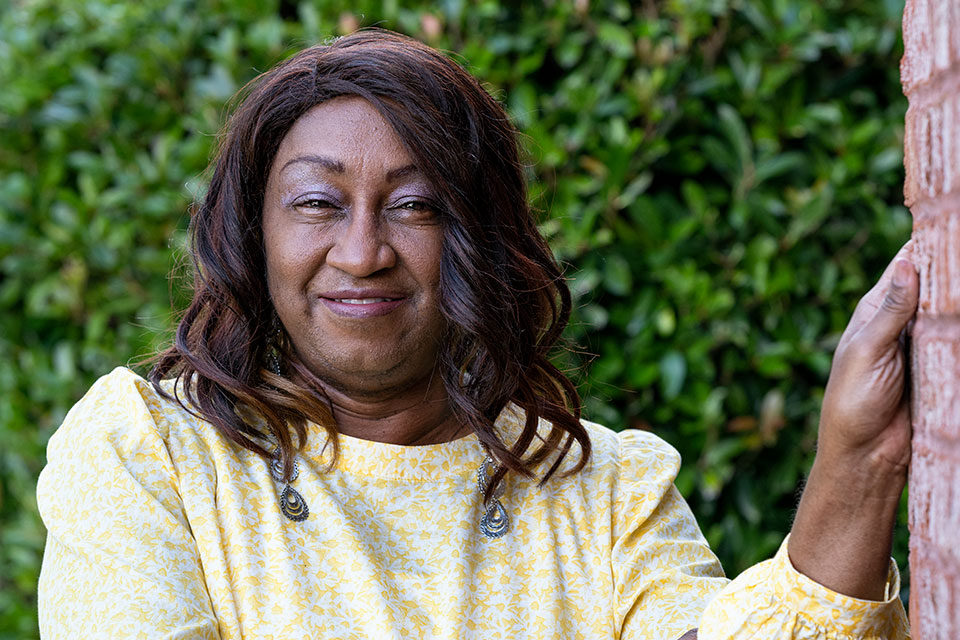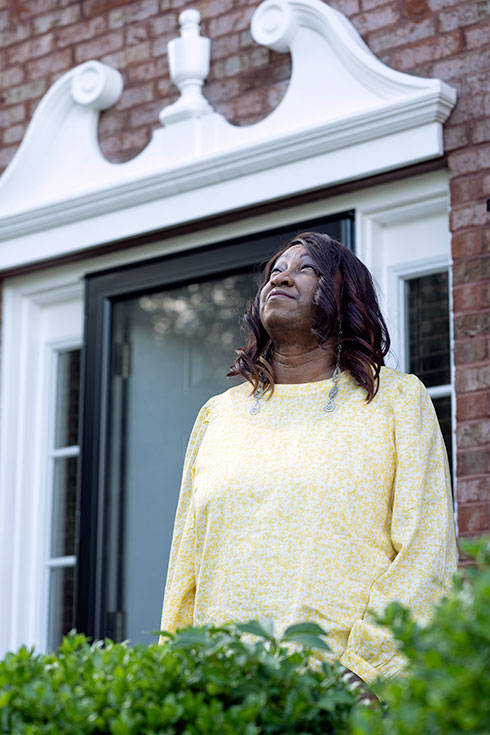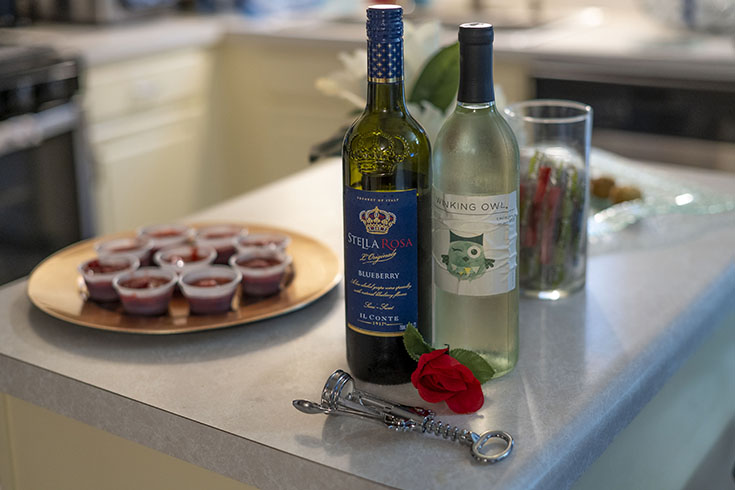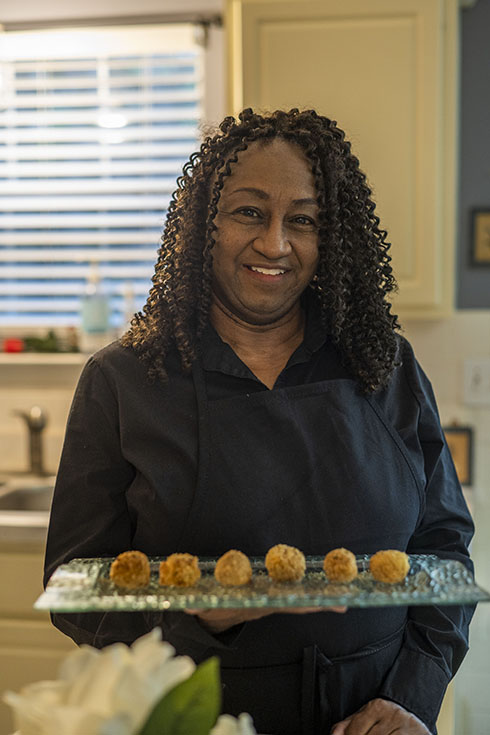Dawn: The bills are coming like 90 going North

Dawn is an African American woman in her mid-fifties, living in the Atlanta metropolitan area in Georgia. During the day, Dawn works for an insurance company, and evenings and weekends she works as a server at events.
Photo Credit: Nydia Blas (all photos)
Dawn was born in Germany, the daughter of a career military man and a homemaker. She and her younger siblings lived on several bases across Europe before moving to New York City, where her father grew up. Because her father had spent some of his childhood in an orphanage, he wanted to make sure his children had a stable home life. He worked hard to provide for them and to be present in their lives.
After retiring from the Air Force, Dawn’s father began working as a teller in a bank and eventually transferred to Atlanta. Dawn and her two younger siblings attended junior high and high school there while her mother decided to go to school, training to be a Certified Nurses’ Assistant. Dawn was grateful for her stable home life with two employed parents, and aware that this gave her a strong foundation and resources that many of her friends did not have.
After she finished high school, Dawn got a job and moved into her own apartment, relishing her independence and proud that she was able to support herself. Through a mutual friend she met a man just coming out of the service, who was ambitious, smart, and so well dressed that his friends called him “GQ.” He told her he planned to start his own business one day. Later when he told her that he wanted to take care of her, he won her heart. She said, “That really stood out because I grew up in a home where my dad always took care of my mom, and he took care of his family. And I thought, wow, this is a family-oriented man.” They got married and several years later had a daughter. Even though her husband had a good job working for Georgia Pacific and she was working as a receptionist, they were still living hand to mouth. When her daughter was five months old, their phone was disconnected because they had fallen behind in the monthly bills.
One night Dawn’s husband went to see a man who owed him some money; they got into an argument, and the man shot him. One of her friends came to the door and told her, “I have some bad news.” She went to the hospital and found her husband’s family in the waiting room. The doctor came out and informed them he had been unable to save him. Her husband was dead.
 Dawn went into a state of shock. Losing him was terrible, and beyond that she soon found out that there was a lot she hadn’t known about him, things his family knew but had not told her. “It’s like I didn’t know him. It’s like I married a stranger, because I found out later that he had a record.” She also found out he was having an affair. “I felt like I lost a part of me…He was cheating on me.” It was only after he died that she found out their rent was in arrears, as was their car payment and electric bill. Her husband had the responsibility for the household budget, but he had not been paying the bills. When she called the car dealership to inform them of her husband’s death, they told her the only reason they had not repossessed the car was because they couldn’t find it.
Dawn went into a state of shock. Losing him was terrible, and beyond that she soon found out that there was a lot she hadn’t known about him, things his family knew but had not told her. “It’s like I didn’t know him. It’s like I married a stranger, because I found out later that he had a record.” She also found out he was having an affair. “I felt like I lost a part of me…He was cheating on me.” It was only after he died that she found out their rent was in arrears, as was their car payment and electric bill. Her husband had the responsibility for the household budget, but he had not been paying the bills. When she called the car dealership to inform them of her husband’s death, they told her the only reason they had not repossessed the car was because they couldn’t find it.
Dawn had to move out of the apartment immediately because she had no way to catch up on rent. Emotionally a mess, she quit her job. She lived with a friend for a while, and then she moved in with her mother. “My mom is a very strong woman and very spiritual. So, I leaned on her a lot and other family members as well friends.” They helped her care for her daughter and she eventually went back to work. She was severely shaken but getting her strength back. “My dad helped me, too. He used to give me a check every week too, on top of social security because of my husband passing.” She became alienated from her dead husband’s family because they had known about him and his nefarious activities, but concealed this information from her.
After about ten years of working and raising her daughter on her own, Dawn met a man she liked. She was confident that he genuinely loved her and wanted to be involved in her daughter’s life. They married and together had a son, who is now 14 years old. Dawn kept on working, but found their combined salaries, even with his tech job working for the state, inadequate for the kind of life they wanted to lead.
 A decade ago, a friend who ran a catering business needed help serving at an event. Dawn volunteered and discovered that she liked the work. With a sunny disposition, Dawn says, “I’m an interactive kind of person.” For her, serving food at weddings and corporate dinners provided an opportunity to be with people, to make them smile and be happy, and to make extra money. Those serving jobs can pay $10 an hour and up, sometimes including tips. Her second job has enabled her family to buy a home in an Atlanta suburb and to take occasional vacations and pay for extracurricular activities for her son.
A decade ago, a friend who ran a catering business needed help serving at an event. Dawn volunteered and discovered that she liked the work. With a sunny disposition, Dawn says, “I’m an interactive kind of person.” For her, serving food at weddings and corporate dinners provided an opportunity to be with people, to make them smile and be happy, and to make extra money. Those serving jobs can pay $10 an hour and up, sometimes including tips. Her second job has enabled her family to buy a home in an Atlanta suburb and to take occasional vacations and pay for extracurricular activities for her son.
In early 2020, Dawn was working for three different caterers, and had plenty of work coming in. “I was able to pick and choose. Then the pandemic hit, social events abruptly halted and, then things just went dead.” The decline in earnings made Dawn realize how fundamental her second job was to her family’s well-being.  Fortunately, her husband has kept his job during the downturn so they continue to have health insurance. That said, stretching income from two jobs far enough to pay all the utility bills, the mortgage, car payments, and still put food on the table has required careful budgeting and juggling. Which bills should she pay when, in order not to have some fundamental service turned off? Could she negotiate with a company to accept a partial payment? Dawn relies on social media to find short-term gigs and takes advantage of food giveaways by a local church. “I have to help run the family and we have expenses. We have, I have, a teenage son and I have grandchildren. So it's like, I have to keep going. I don't have an option. Because the bills are coming like 90 going North. And as soon as we get paid, and the money's gone.”
Fortunately, her husband has kept his job during the downturn so they continue to have health insurance. That said, stretching income from two jobs far enough to pay all the utility bills, the mortgage, car payments, and still put food on the table has required careful budgeting and juggling. Which bills should she pay when, in order not to have some fundamental service turned off? Could she negotiate with a company to accept a partial payment? Dawn relies on social media to find short-term gigs and takes advantage of food giveaways by a local church. “I have to help run the family and we have expenses. We have, I have, a teenage son and I have grandchildren. So it's like, I have to keep going. I don't have an option. Because the bills are coming like 90 going North. And as soon as we get paid, and the money's gone.”
Dawn describes herself as a spiritual person, adhering closely to the tradition in which she was raised. Her faith feeds her optimism and helps her face the future. “It's a driving force of encouragement that keeps me going.”
As the Georgia economy picks up after more than a year of shutting down, Dawn is once again starting to get calls from caterers and event planners. She has had to turn down jobs some weekends because she simply cannot do them all. Because of the service worker shortage, she has more leverage. Now she is setting $20 an hour minimum and she asks for gas money to pay for transportation, and gets it. “I’m getting older, you have to kind of, and I don’t mean demand in a demanding derogatory way, but just kind of have to put your foot down and demand your worth. Especially if you’re a quality worker, cause my work is quality.”